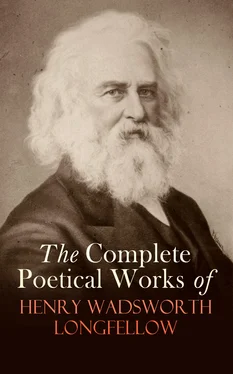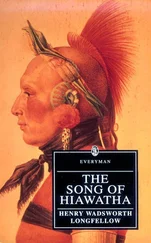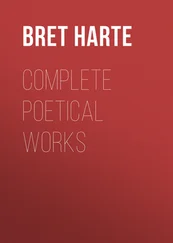For in thy darkness and distress
New light and strength they give!
And he who has not learned to know
How false its sparkling bubbles show,
How bitter are the drops of woe,
With which its brim may overflow,
He has not learned to live.
The prayer of Ajax was for light;
Through all that dark and desperate fight
The blackness of that noonday night
He asked but the return of sight,
To see his foeman's face.
Let our unceasing, earnest prayer
Be, too, for light—for strength to bear
Our portion of the weight of care,
That crushes into dumb despair
One half the human race.
O suffering, sad humanity!
O ye afflicted one; who lie
Steeped to the lips in misery,
Longing, and yet afraid to die,
Patient, though sorely tried!
I pledge you in this cup of grief,
Where floats the fennel's bitter leaf!
The Battle of our Life is brief
The alarm—the struggle—the relief,
Then sleep we side by side.
Table of Contents
Maiden! with the meek, brown eyes, In whose orbs a shadow lies Like the dusk in evening skies!
Thou whose locks outshine the sun, Golden tresses, wreathed in one, As the braided streamlets run!
Standing, with reluctant feet, Where the brook and river meet, Womanhood and childhood fleet!
Gazing, with a timid glance, On the brooklet's swift advance, On the river's broad expanse!
Deep and still, that gliding stream Beautiful to thee must seem, As the river of a dream.
Then why pause with indecision, When bright angels in thy vision Beckon thee to fields Elysian?
Seest thou shadows sailing by, As the dove, with startled eye, Sees the falcon's shadow fly?
Hearest thou voices on the shore, That our ears perceive no more, Deafened by the cataract's roar?
O, thou child of many prayers! Life hath quicksands—Life hath snares Care and age come unawares!
Like the swell of some sweet tune, Morning rises into noon, May glides onward into June.
Childhood is the bough, where slumbered Birds and blossoms many-numbered;—Age, that bough with snows encumbered.
Gather, then, each flower that grows, When the young heart overflows, To embalm that tent of snows.
Bear a lily in thy hand; Gates of brass cannot withstand One touch of that magic wand.
Bear through sorrow, wrong, and ruth, In thy heart the dew of youth, On thy lips the smile of truth!
O, that dew, like balm, shall steal Into wounds that cannot heal, Even as sleep our eyes doth seal;
And that smile, like sunshine, dart Into many a sunless heart, For a smile of God thou art.
Table of Contents
The shades of night were falling fast,
As through an Alpine village passed
A youth, who bore, 'mid snow and ice,
A banner with the strange device,
Excelsior!
His brow was sad; his eye beneath,
Flashed like a falchion from its sheath,
And like a silver clarion rung
The accents of that unknown tongue,
Excelsior!
In happy homes he saw the light
Of household fires gleam warm and bright;
Above, the spectral glaciers shone,
And from his lips escaped a groan,
Excelsior!
"Try not the Pass!" the old man said:
"Dark lowers the tempest overhead,
The roaring torrent is deep and wide!
And loud that clarion voice replied,
Excelsior!
"Oh stay," the maiden said, "and rest
Thy weary head upon this breast!"
A tear stood in his bright blue eye,
But still he answered, with a sigh,
Excelsior!
"Beware the pine-tree's withered branch!
Beware the awful avalanche!"
This was the peasant's last Good-night,
A voice replied, far up the height,
Excelsior!
At break of day, as heavenward
The pious monks of Saint Bernard
Uttered the oft-repeated prayer,
A voice cried through the startled air,
Excelsior!
A traveller, by the faithful hound,
Half-buried in the snow was found,
Still grasping in his hand of ice
That banner with the strange device,
Excelsior!
There in the twilight cold and gray,
Lifeless, but beautiful, he lay,
And from the sky, serene and far,
A voice fell, like a falling star,
Excelsior!
Table of Contents
Table of Contents
[The following poems, with one exception, were written at sea, in the latter part of October, 1842. I had not then heard of Dr. Channing's death. Since that event, the poem addressed to him is no longer appropriate. I have decided, however, to let it remain as it was written, in testimony of my admiration for a great and good man.]
Table of Contents
The pages of thy book I read,
And as I closed each one,
My heart, responding, ever said,
"Servant of God! well done!"
Well done! Thy words are great and bold;
At times they seem to me,
Like Luther's, in the days of old,
Half-battles for the free.
Go on, until this land revokes
The old and chartered Lie,
The feudal curse, whose whips and yokes
Insult humanity.
A voice is ever at thy side
Speaking in tones of might,
Like the prophetic voice, that cried
To John in Patmos, "Write!"
Write! and tell out this bloody tale;
Record this dire eclipse,
This Day of Wrath, this Endless Wail,
This dread Apocalypse!
Table of Contents
Beside the ungathered rice he lay,
His sickle in his hand;
His breast was bare, his matted hair
Was buried in the sand.
Again, in the mist and shadow of sleep,
He saw his Native Land.
Wide through the landscape of his dreams
The lordly Niger flowed;
Beneath the palm-trees on the plain
Once more a king he strode;
And heard the tinkling caravans
Descend the mountain-road.
He saw once more his dark-eyed queen
Among her children stand;
They clasped his neck, they kissed his cheeks,
They held him by the hand!—
A tear burst from the sleeper's lids
And fell into the sand.
And then at furious speed he rode
Along the Niger's bank;
His bridle-reins were golden chains,
And, with a martial clank,
At each leap he could feel his scabbard of steel
Smiting his stallion's flank.
Before him, like a blood-red flag,
The bright flamingoes flew;
From morn till night he followed their flight,
O'er plains where the tamarind grew,
Till he saw the roofs of Caffre huts,
And the ocean rose to view.
At night he heard the lion roar,
And the hyena scream,
And the river-horse, as he crushed the reeds
Beside some hidden stream;
And it passed, like a glorious roll of drums,
Through the triumph of his dream.
The forests, with their myriad tongues,
Shouted of liberty;
And the Blast of the Desert cried aloud,
With a voice so wild and free,
That he started in his sleep and smiled
At their tempestuous glee.
He did not feel the driver's whip,
Nor the burning heat of day;
For Death had illumined the Land of Sleep,
And his lifeless body lay
A worn-out fetter, that the soul
Had broken and thrown away!
Table of Contents
THAT SHALL NOT BE TAKEN AWAY
Table of Contents
She dwells by Great Kenhawa's side,
In valleys green and cool;
And all her hope and all her pride
Are in the village school.
Читать дальше












